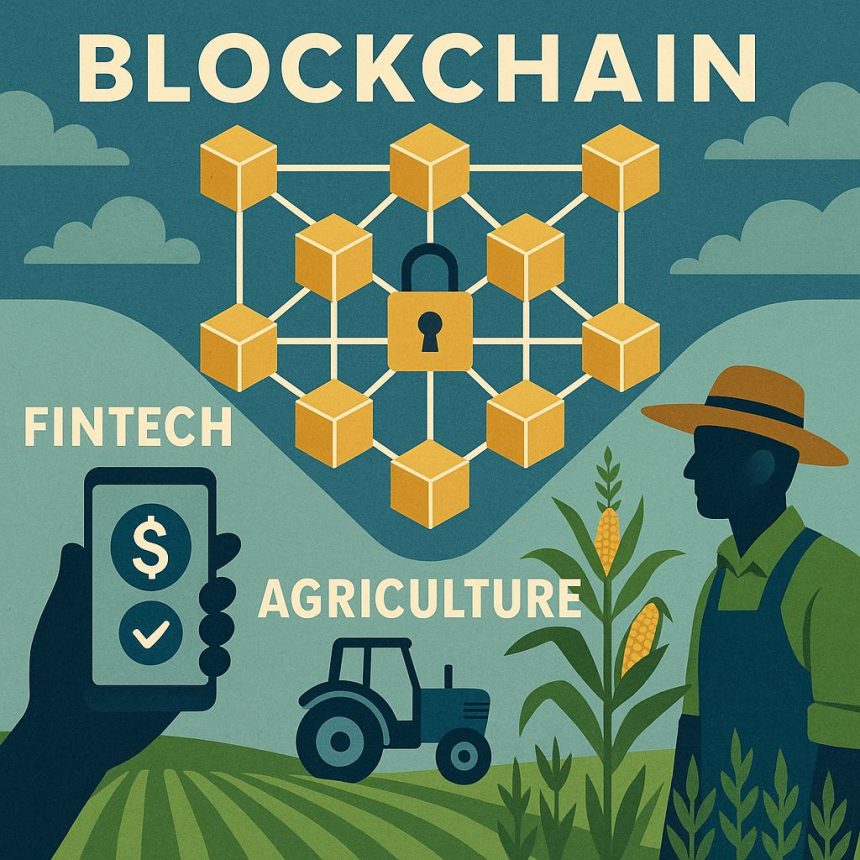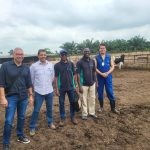Blockchain & Fintech vs Agricultural Investment in the 21st Century: Which Holds Africa’s Billion-Dollar Future?
By Dr. Aiyeku Olufemi Samuel
Co-Founder and Lead Consultant, Global Human Capital & Energy Management Limited
“While Africa is busy chasing apps, algorithms, and avatars, the continent is bleeding billions on what it eats.”
— Anonymous African Agripreneur
In today’s rapidly evolving technological landscape, Africa stands at a crucial crossroads. Across boardrooms, think tanks, policy circles, and development forums from Lagos to Kigali, one pressing question echoes louder than most: Where does Africa’s next billion-dollar opportunity truly lie—in blockchain-powered fintech or in revitalizing its ailing agricultural sector?
Fintech: Africa’s Dazzling Distraction or Game-Changer?
Fintech has indeed revolutionized Africa’s financial services landscape. With innovations like M-Pesa, Flutterwave, and Paystack, mobile banking has unlocked access to financial services for over 400 million people on the continent. Blockchain, on the other hand, is redefining transparency in elections, supply chains, and digital identity.
According to McKinsey (2024), Africa’s fintech revenues are expected to reach $230 billion by 2025. That’s an impressive trajectory. Yet, these platforms still operate in economies where a large percentage of the population remains undernourished or food insecure. And here lies the paradox.
Agriculture: The Sleeping Economic Giant
Despite 60% of the world’s uncultivated arable land residing in Africa, the continent imports more than \$50 billion worth of food every year. Worse still, about 40% of agricultural produce is lost post-harvest due to poor logistics, lack of cold storage, and fragmented supply chains.
Why is this happening in a land so abundantly blessed?
The answer lies not in the soil, but in the system.
Rhetorical question: Are we building first-world technologies while ignoring third-world realities?
Answer: Yes. And the result is a digital future built on a fragile economic foundation.
The Real Issue: Not Farming, But the Agricultural Value Chain
Africa doesn’t suffer from a farming problem. It suffers from a value chain problem. A continent that can grow tomatoes year-round still sees imported ketchup on its supermarket shelves. That’s not inefficiency—it’s economic leakage.
As Akinwumi Adesina of the African Development Bank put it,
“A farmer produces onions in Kano, but they rot before reaching Lagos. That’s not an agriculture problem; that’s a logistics, finance, and cold storage failure.”
Why Agriculture Feels Slower for Investors
One of the most common arguments against large-scale agricultural investment is its slower return on investment. It’s true—agriculture has a longer maturity period. A crop may take six months or more to mature. Infrastructure and logistics require even more time and capital.
Agriculture also demands higher upfront investment, especially for commercial-scale production, which involves land acquisition, mechanization, irrigation, storage, and distribution systems.
Compared to fintech, where entry barriers are lower and returns faster, agriculture feels like a marathon in a world that now prefers sprints.
But here’s the key difference: agriculture feeds the sprints. Without food security, fintech can’t flourish.
Why the Agricultural Sector Still Wins Long-Term
World Bank estimates place Sub-Saharan Africa’s agriculture sector at over \$313 billion annually. With systemic reform, that figure could soar to \$1 trillion by 2030. In contrast, even the booming fintech industry trails far behind in long-term GDP contribution and job creation.
Africa’s agriculture employs over 60% of its population. No tech sector comes close to that. The opportunity is not just in producing more, but in building the infrastructure that supports this production.
What Can Be Done: A Call for Strategic Integration
Instead of fintech *versus* agriculture, the question should be: How can fintech *serve* agriculture?
Here’s where the synergy lies:
• Use mobile banking to provide microloans to smallholder farmers
• Deploy blockchain for land ownership verification and to reduce land disputes
• Introduce digital platforms that connect farmers to buyers, insurers, and logistics providers
• Develop e-extension platforms for virtual training on climate-smart farming
• Implement smart supply chain tracking systems using blockchain
**The Real Giants Are Quietly Building Below the Surface**
The billionaires of tomorrow in Africa may not wear hoodies or pitch tokens. They may be logistics innovators in Rwanda, women-led cassava processors in Cross River, or young agricultural economists driving policy change in Botswana.
As Tony Elumelu said,
“The next African billionaires will not just be techpreneurs. They will be agripreneurs — people who fix the system beneath the surface.”
Strategic Recommendations for Investors and Policymakers
• Rebalance capital flows: Treat agribusiness as essential infrastructure
• Tax incentives: Offer tax holidays for agro-processing ventures and local manufacturing
• Youth training: Position agriculture as an aspirational, tech-driven career
• Innovate finance: Create fintech platforms built specifically for agriculture, not urban elites
• Climate focus: Invest in sustainable, climate-resilient farming systems
• Research and development: Prioritize seed technology, irrigation innovations, and soil mapping
Why Governments Should Pay Attention?
According to the FAO, by 2050 Africa’s population will double to over 2.5 billion. The pressure on food systems will triple. Technology alone can’t feed a hungry continent.
Any serious government must look beyond the excitement of tech hubs and address the food systems crisis at its root. A thriving agriculture sector stabilizes the economy, reduces conflict, and fosters self-sufficiency.
Conclusion: Feeding the Future Is the Real Revolution
Africa is hungry — not just for innovation, but for nourishment. The key to sustainable prosperity is not in choosing between blockchain and agriculture, but in using technology to unlock the true value of Africa’s food systems.
“He who controls the food, controls the people. He who feeds the people, leads the future.”
— African Proverb (adapted)
Let’s build apps that harvest grain, not just likes. Let’s train farmers in blockchain-backed cooperatives, not just urban coders. Let’s feed the continent and the world.
Dr. Aiyeku Olufemi Samuel
Governance Analyst, Development Economist & Strategic Development Advocate
Co-Founder & Lead Consultant Global Human Capital & Energy Management Limited












